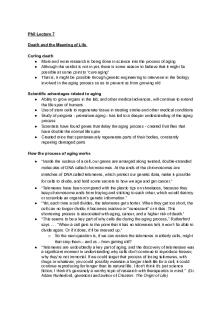Phil 201 - List of informal logical fallacies of relevance from Dr. Jones\' phil 201-008 PDF

| Title | Phil 201 - List of informal logical fallacies of relevance from Dr. Jones\' phil 201-008 |
|---|---|
| Course | Philosophy and Contemporary Ideas |
| Institution | Liberty University |
| Pages | 3 |
| File Size | 69.3 KB |
| File Type | |
| Total Downloads | 98 |
| Total Views | 133 |
Summary
List of informal logical fallacies of relevance from Dr. Jones' phil 201-008 ...
Description
Informal Logical Fallacies of Relevance Phil 201-008 Dr. Jones 2019-2020 Fallacies of “Relevance” (resulting from inattention to some aspect of the argument) 1. Appeal to Force: solving an argument by appeaing to force rather than logic -fallacy because it focuses on winning rather than the truth -Machiavelli’s “might makes right” – the bully on the playground
2. Argumentum Ad hominem (appeal to the man): attacks the person rather than the argument - Abusive: attacks the opponent in a way that they look bad - Circumstantial: argues that a position is false by pointing out irrelevant details about its proponent - Circumstantial acts almost as a red herring to take attention away form the argument 3. Argument From Silence: argues this is true because it cannot be proven false - Just because you cannot personally prove something false does not mean it’s true. Someone else could always prove it false. - “you can’t prove that there isn’t really a waffle house on the dark side of the moon so it must actually be there!” 4. Appeal to The Crowd: convincing by a populist and often emotional appeal -starting with something that the crowd agrees with before controversy
5. Appeal to Pity: tries to convince by arousing sympathy in the listener 6. Appeal to Authority: citing the support of an unqualified expert -“well my dad says……” 7. Begging The Question: assuming in your answer the very thing the question asks you to prove -how do you know God exists? -because the Bible told me so! -AKA circular reasoning 8. False Cause (post hoc, ergo protor hoc): mistakenly attributing causality to something -“don’t wash your car, it’ll rain” 9. Complex Question: asking a question that presumes an answer to another, unexpressed question -“are you still beating your husband?” 10. False Dilemma: posing a question so that your options are fewer than are really possible -“are you a Democrat or a Republican?” -well you could be neither 11. Genetic Fallacy: argues that a position is false because of some detail about its origin (its genesis) -Example: Christian rock can’t be good because the origins of rock music are bad -Christians cannot do yoga because it started as a Hindu practice 12. Straw Man: giving the impression of refuting an opponent's argument, while actually refuting an argument that was not presented by that opponent.
2
13. Red Herring: something that misleads or distracts from the important issue of the argument. Can be intentional or not. 14. Self-Referential Incoherence: the statement does not live up to its own standard - Example: “only scientific statements are true” is not itself a scientific statement 15. Non-Sequitor: the conclusion does not logically flow from the evidence/argument - Example: this is my body, and I have the right to do what I want with it, therefore I have the right to an abortion
3...
Similar Free PDFs

3.2 Fallacies of Relevance
- 5 Pages

Phil 201 Quiz 1 Notes
- 2 Pages

Logical Fallacies
- 2 Pages

Phil of religion essay draft
- 2 Pages

Logical Fallacies
- 7 Pages

GOOD COPY- PHIL 201 Short Essay
- 3 Pages

Logical Fallacies on Memes
- 2 Pages

Logical Fallacies Project
- 12 Pages

PHIL Forum - Grade: A+
- 1 Pages

PHIL 166 Syllabus
- 6 Pages

PHIL 306 Lyotard
- 3 Pages

PHIL quiz answers
- 16 Pages
Popular Institutions
- Tinajero National High School - Annex
- Politeknik Caltex Riau
- Yokohama City University
- SGT University
- University of Al-Qadisiyah
- Divine Word College of Vigan
- Techniek College Rotterdam
- Universidade de Santiago
- Universiti Teknologi MARA Cawangan Johor Kampus Pasir Gudang
- Poltekkes Kemenkes Yogyakarta
- Baguio City National High School
- Colegio san marcos
- preparatoria uno
- Centro de Bachillerato Tecnológico Industrial y de Servicios No. 107
- Dalian Maritime University
- Quang Trung Secondary School
- Colegio Tecnológico en Informática
- Corporación Regional de Educación Superior
- Grupo CEDVA
- Dar Al Uloom University
- Centro de Estudios Preuniversitarios de la Universidad Nacional de Ingeniería
- 上智大学
- Aakash International School, Nuna Majara
- San Felipe Neri Catholic School
- Kang Chiao International School - New Taipei City
- Misamis Occidental National High School
- Institución Educativa Escuela Normal Juan Ladrilleros
- Kolehiyo ng Pantukan
- Batanes State College
- Instituto Continental
- Sekolah Menengah Kejuruan Kesehatan Kaltara (Tarakan)
- Colegio de La Inmaculada Concepcion - Cebu



